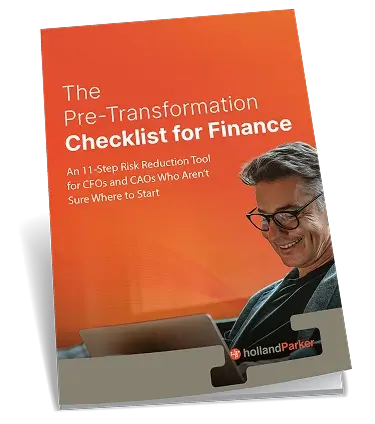

As organizations navigate digital disruption, shifting regulatory landscapes, and rising stakeholder expectations, the role of the Chief Financial Officer (CFO) is undergoing a fundamental transformation. No longer confined to stewardship and cost control, today’s CFO must lead the charge in redefining how finance delivers value to the enterprise. At the forefront of this evolution is finance transformation — a strategic, technology-enabled overhaul of financial processes, systems, and capabilities. For companies like Holland Parker, which specialize in Corporate Performance Management (CPM) implementation and advisory services, the imperative is clear: CFOs must not only participate in the transformation of finance — they must champion it.
Finance transformation is not merely an IT project or a back-office modernization effort. It is a forward-looking strategic initiative that demands visionary leadership, cross-functional collaboration, and a clear focus on value creation. This article explores why CFOs are uniquely positioned to drive this agenda, the four most impactful subtopics related to this initiative, and actionable recommendations for organizations striving to unlock the full potential of their finance function.
Elevating Finance as a Strategic Value Creator
The most significant shift in the CFO’s role is from financial gatekeeper to strategic partner. According to Gartner, 89% of finance leaders plan to increase investment in digital capabilities over the next two years, with a clear focus on leveraging data to drive business outcomes. This trend reflects the growing expectation for finance to provide not just historical reports but forward-looking insights that inform corporate strategy.
Historically, the finance department focused on budgeting, compliance, and reporting. While these remain foundational, stakeholders now expect finance teams to deliver:
- Predictive analytics for proactive decision-making
- Real-time reporting to improve agility
- Integrated planning that aligns finance with operations, marketing, and HR
- Risk modeling that anticipates disruption and enables scenario planning
For CFOs, embracing this strategic mindset means rethinking the metrics of success. It requires moving beyond EBITDA and cash flow statements to metrics that reveal business health and opportunities for innovation. CFOs must become fluent in the language of growth and performance, leveraging tools like CPM platforms and advanced analytics to connect finance with enterprise-wide value creation.
Unlocking the Power of Technology and Automation
Digital transformation in finance is powered by an array of technologies that automate, accelerate, and enhance traditional processes. These include robotic process automation (RPA), artificial intelligence (AI), machine learning, cloud-based ERP, and next-generation CPM tools. According to McKinsey, automation alone can reduce finance operations costs by up to 40%, freeing teams to focus on high-value tasks.
However, technology is only as effective as the vision behind it. CFOs must lead digital finance transformations by:
- Identifying automation opportunities across transactional finance
- Standardizing and digitizing core processes
- Championing enterprise-wide adoption of cloud CPM platforms
- Ensuring robust data governance and security standards
- Training and reskilling finance teams to work alongside AI and automation
Companies that deploy technology without strategic guidance often face fragmented systems, low user adoption, and underwhelming ROI. CFOs must act as integrators — aligning technology investments with business goals, enabling seamless data flow, and ensuring the transformation delivers measurable business impact.
Leading Cultural and Organizational Change
Finance transformation is as much about people as it is about process and technology. Successful transformation demands a cultural shift — from risk-averse to data-driven, from reactive to predictive, and from siloed to collaborative. Here, CFOs must serve as change agents who inspire, guide, and empower their teams.
According to a study by PwC, 63% of finance professionals cite culture as the top barrier to transformation. Overcoming this requires CFOs to:
- Communicate a compelling vision for finance’s future
- Foster a culture of continuous improvement and innovation
- Break down silos between finance and other business functions
- Promote agile working models and cross-functional teams
- Invest in leadership development and digital skills training
Transformation often fails when it is seen as a top-down mandate rather than a collaborative journey. CFOs must engage finance professionals at every level, ensuring they understand not just the “what” but the “why” behind change. Encouraging experimentation, recognizing early wins, and embedding transformation into performance goals can catalyze long-lasting cultural shifts.
Driving Enterprise-Wide Alignment Through CPM Leadership
Corporate Performance Management (CPM) platforms are central to aligning finance strategy with enterprise goals. As experts in CPM advisory and implementation, Holland Parker understands that a well-deployed CPM system empowers finance teams to lead strategic planning, budgeting, forecasting, and performance reporting with precision and agility.
CFOs must leverage CPM platforms not just for financial reporting, but to:
- Integrate operational and financial planning in real time
- Enable enterprise-wide visibility and accountability
- Support scenario analysis and stress testing
- Foster dynamic planning cycles that respond to market shifts
By embedding CPM capabilities across business units, finance becomes the nexus of informed decision-making. This approach ensures that corporate goals cascade seamlessly into departmental plans, performance is measured consistently, and strategic pivots can be made rapidly based on real-time data.
CFOs must ensure the CPM strategy is not treated as an IT deployment, but as a business-critical capability. That includes choosing the right technology partner, like Holland Parker, ensuring governance and data integrity, and continuously evolving the platform to match business complexity.
Taking Action: CFOs as Catalysts of Competitive Advantage
The finance function sits at a unique intersection of insight, influence, and infrastructure. For CFOs, this creates a once-in-a-generation opportunity to redefine what finance means in the modern enterprise. By leading transformation efforts, CFOs can elevate their function from compliance enforcer to strategic powerhouse — one that enables innovation, resilience, and growth.
Now is the time for CFOs to step forward:
- Assess your organization’s financial maturity and digital readiness
- Build a transformation roadmap tied to strategic objectives
- Engage your finance teams early to drive ownership and buy-in
- Prioritize investments in scalable, cloud-native CPM solutions
- Partner with implementation experts like Holland Parker to accelerate execution
Take the Lead in Finance Transformation with Holland Parker
If you’re a CFO ready to transition from operational manager to strategic leader, now is the time to act. Holland Parker is your trusted partner in delivering finance transformation through world-class Corporate Performance Management (CPM) solutions. Our team of implementation and advisory experts works alongside finance leaders to align planning, forecasting, and reporting with the strategic vision of the business.
We don’t just implement software — we architect transformation. Whether you’re optimizing existing systems or beginning a full-scale digital overhaul, we bring the experience, precision, and insight required to turn your finance function into a performance powerhouse.
Empower your team, modernize your processes, and lead your organization with data-backed confidence.
Connect with Holland Parker today to build your roadmap for enterprise-wide finance transformation — and start driving measurable results.




